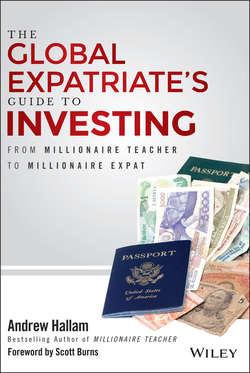Читать книгу The Global Expatriate's Guide to Investing - Hallam Andrew - Страница 11
На сайте Литреса книга снята с продажи.
Chapter 1
Setting Your Bull's-Eye
Cooking Up the Road Less Traveled
ОглавлениеForty-eight-year-old chef Shane Brierly desires a more upscale retirement than he could afford in his home country. The New Zealand native left Australia in 2004 to work in Dubai. He explains, “I thought it would give me an edge, giving me a more comfortable financial position than previously.”
But instead of moving back to Australia, Shane moved to Vietnam, where he works as a chef at the Pullman Hotel in Ho Chi Minh City. Now he's planning to retire overseas. “The respect and community values in Asia really inspire me,” says Shane. “Not so many criminals, a culture of nonviolence and respect, plus awesome food.
“Costs of living are also lower,” he adds, “and these countries are far less materialistic.” Shane's views on materialism were altered by misfortune. “But it was a blessing in disguise,” he says.
A shipping company lost all of his household goods when he moved from Dubai to Vietnam. Initially forced to live with less, he warmed to its simplicity. “Owning a whole lot of stuff means maintaining, repairing, replacing, or running it.” He no longer buys what he doesn't need, preferring to spend his money on traveling instead. Gaining experiences, Shane explains, is more fulfilling than acquiring possessions. “The Western economy runs on unneeded goods and services, and everyone lives to consume. You need half your income just to sustain impulse buys and comfort purchases. The rest disappears on essentials and tax.”
Shane doesn't live like a monk. He lives simply, but doesn't mind paying a premium for quality. In a country where you can survive on a relative shoestring, he claims you can live well on $3,000 per month ($36,000 annually). “I love exploring. It's inexpensive to travel locally in Southeast Asia or in Vietnam, and you can splash out quite affordably and have a comfortable life.” He plans to retire in central Vietnam, Laos, Cambodia, or Chile. But he'll be keeping his hands in the hospitality business. “I’ll probably set up a restaurant or guesthouse to run. To be financially free at 60 would rock, but retiring at age 65 is more likely.”13
If Shane wants to retire with an income of $36,000 a year, he'll need to make adjustments. Inflation is greedy, sometimes frighteningly so.
Inflation.eu compiles country inflation figures. In 1981, Canada's inflation rate recorded 12.12 percent; in 1975 Great Britain's peaked at 24.89 percent; and in 1979 the cost of living in the United States rose 13.29 percent.14 Those lamenting the good old days of the late 1970s and early 1980s, when savings accounts paid 10 percent a year, may have forgotten inflation's gluttony.
Lately, inflation's appetite has slowed. The decade ending 2012 saw Canada's annual inflation average 1.83 percent, Great Britain recorded 2.64 percent, and the United States averaged 2.41 percent per year.15
But past decade levels are rarely repeated in the future. Caution is prudent. In this case, let's assume inflation will average 3.5 percent each year – which is slightly higher than the developed world's 100-year average.
Shane plans to retire in 17 years, when he turns 65. If inflation averages 3.5 percent, he'll spend $64,608 annually 17 years from now to give himself and his wife the same buying power that $36,000 would provide today. In other words, if $36,000 can buy a certain number of goods and services now, it would require $64,608 to purchase those same goods and services in 17 years.
To make the postinflation adjustment, Shane went to www.moneychimp.com and clicked Calculator. Figure 1.1 shows how he used the website to estimate his postinflation income equivalency.
Figure 1.1 Shane Brierly's Postinflation Adjustment
SOURCE: www.moneychimp.com.
13
Interview with Shane Brierly. E-mail interview by author, June 30, 2013.
14
“Inflation – Current and Historic Inflation by Country,” Inflation.eu. Accessed April 30, 2014. www.inflation.eu/.
15
Ibid.
